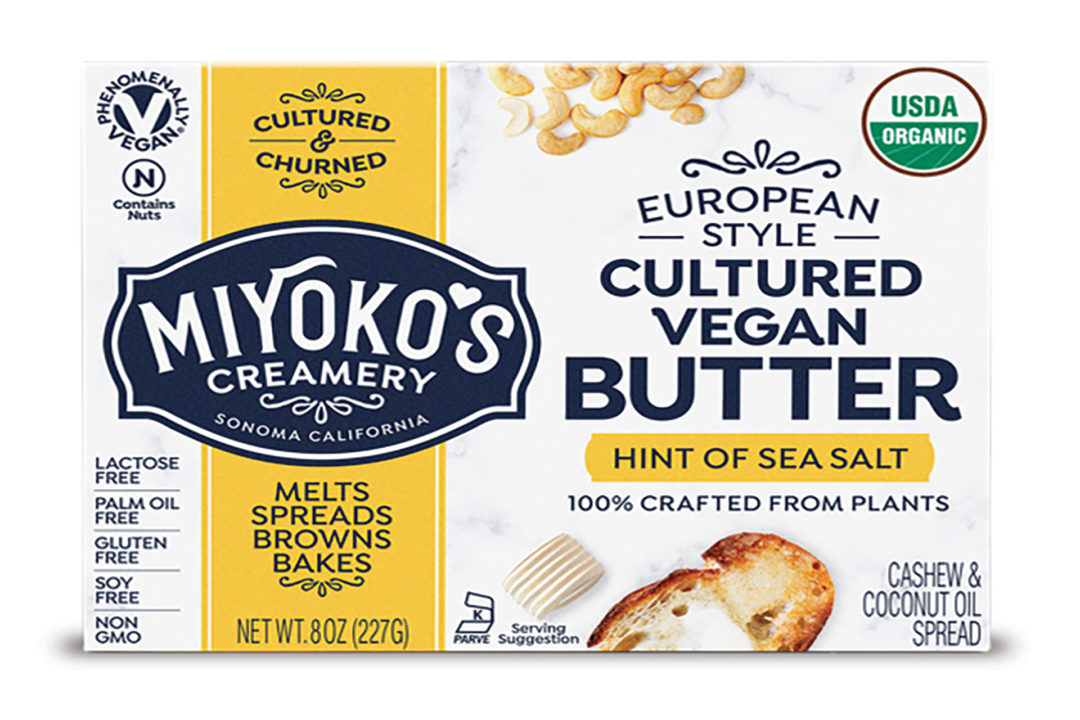With the rapid growth of the vegan market worldwide—the U.S. vegan butter industry alone is valued at $198 million, which greatlyoutpaces the growth of the dairy butter industry—there have been a number of legal clashes between the two industries. Most recently, the U.S. District Court for the Northern District of California ruled that the First Amendment free-speech rights of a vegan butter company deserve to be protected. “Language evolves,” the Judge noted in his ruling.
Standards of Identity
More than a century ago, the United States Supreme Court inMcCray v. United States, 195 U.S. 27 (1904),ruled that “for the purposes of this act [the Oleomargarine Tax Act of 1886] the word ‘butter’ shall be understood to mean the food product usually known as butter, and which is made exclusively from milk or cream, or both, with or without common salt, and with or without additional coloring matter.”The “butter” definition was then codified in March 1923, as Title 21 U.S.C. Section 321a, with this standard of identity: “For the purposes of the Food and Drug Act of June 30, 1906 (Thirty-fourth Statutes at Large, page 768) “butter” shall be understood to mean the food product usually known as butter, and which is made exclusively from milk or cream, or both, with or without common salt, and with or without additional coloring matter, and containing not less than 80 per centum by weight of milk fat, all tolerances having been allowed for.”
And in the century since that decision and codification, the dairy industry has jealously and capably been guarding that standard of identity as if its life depended upon it—which in some sense, it did and still does. With the heavy competition of cheap margarine—one molecule away from ordinary plastic—healthier butters faced very stiff market competition, especially when a clever but deceptive marketing campaign launched by the margarine industry wrongfully portrayed butter as the artery-clogging cause of heart attacks.
Parenthetically, even now, with the lie of that anti-butter campaign having been exposed, the myth of “deadly” butter still lingers on, particularly at Codex Alimentarius meetings where I have argued on behalf of the National Health Federation (NHF) in one committee meeting after another that the Codex delegates are setting cholesterol standards based upon a false premise about the dairy-heart-attack connection. Of course, the International Dairy Federation agrees with NHF and argued too against harmful dairy standards, as have Malaysia and several other countries, but myths die hard, particularly this one.
To be clear, in the United States, the Food and Drug Administration (FDA) is authorized to set the “standards of identity” for food products whenever, in its judgment, it “will promote honesty and fair dealing in the interest of consumers.” And in 21 U.S.C. Section 321a, the FDA did just that for “butter,” just as it has done for some 300 other food products.
By law, if a food is subject to a standard of identity, then the food will be considered misbranded unless it conforms in every respect to that standard of identity. However, States, too, can set their own standards, although most States simply refer to the Federal ones. California is one of the few States with even stricter state-set standards than those set by the U.S. government. In California, companies making any food claims bear the burden of proof and must show that those claims are not misleading.
Miyoko’s Kitchen Tackles the State of California
Miyoko’s Creamery(formerly Miyoko’s Kitchen, Inc.) is a high-quality, vegan food company located in Sonoma County, California that understandably prides itself on providing plant-based “butter” and “cheese” alternatives to traditional dairy butter and cheeses. The company’s vegan products are widely sold through such stores as Whole Foods Market, Trader Joe’s, and some large supermarket chains.In December 2019, the California Department of Food and Agriculture sent Miyoko’s Kitchen a letter alleging that the company’s “vegan butter” gave the misleading and therefore illegal impression of “a dairy food without [traditional dairy] characteristics.” The letter instructed Miyoko’s to remove five claims—“butter,” “lactose free,” “hormone free,” “cruelty free,” and “revolutionizing dairy with plants”—from the company’s product labeling, scrap the website’s mission statement, and take down the cow imagery on its website. Amazingly, the Department later somehow came to its senses about the website’s mission statement and imagery, conceding that it “lacks statutory authority” to regulate Miyoko’s website.
In February 2020, Miyoko’s Kitchen filed a lawsuit in Federal court against the Department. Among other things, the lawsuit alleged that other plant-based dairy products such as almond butter and soy milk are sold without any State compliance issues, Miyoko’s product labeling does not create confusion among reasonable consumers, and the State’s regulatory action constitutes censorship of the company’s commercial free-speech rights. The State of California defended on the basis that a statutory standard of identity exists for butter that would preclude any non-dairy butters and the company’s labeling is false and misleading.
Miyoko’s survived a motion to dismiss its complaint. The company also won a motion for preliminary injunctive relief in mid-2020. But in December 2020, the Department went for the jugular and filed a summary judgment motion, which in March 2021, triggered Miyoko’s filing of its own cross-motion for summary judgment.
On August 10, 2021, U.S. Chief District Court Judge Richard Seeborg ruled on both parties’ respective motions for summary judgment in favor of Miyoko’s Kitchen on the “vegan butter” label issue and in favor of the State of California on the “hormone free” label issue (since plants are not hormone free). Judge Seeborg determined that absent evidence that the “vegan butter” label was false or would mislead consumers, the State of California could not restrict Miyoko’s constitutionally protected commercial speech. Miyoko’s Kitchen, Inc. v. Karen Ross, Case No. 20-cv-00893-RS (N.D. Cal. August 10, 2021).
Reading the Court’s 13-page written decision, I was impressed with the thoroughness of the ruling. In disposing of the Department’s argument that a statement of identity existed that was unchallengeable on the misbranding issue, Judge Seeborg cited the case of Ocheesee Creamery LLC v. Putnam, 851 F.3d 1228, 1238 (11th Cir. 2017), which case had noted that “it does not follow that once a state has [defined a term] ..., any use of the term inconsistent with the state’s preferred definition is inherently misleading.” The Judge then definitively disposed of the issue when he wrote that the Department, “argues that § 321a in particular deserves a sort of constitutional credit for old age: because the statute has been on the books for ninety-odd years, it must be especially reflective of what consumers understand 'butter' to mean. This logic, which finds no footing in the State’s cited authorities, defies common sense. Quite simply, language evolves. Absent anything from the State revealing why old federal food definitions are more faithful indicators of present-day linguistic norms, neither the fact nor the vintage of the federal definition of 'butter' counts against Miyoko’s.”
This recent victory for Miyoko’s upholds not only Miyoko’s First Amendment right to use terms like butter and cheese in marketing its vegan, plant-based products, but also that of all other vegan companies who use similar non-misleading product labels. Yet, the battle in other States, including inMississippi,Arkansas,Texas, andLouisianacontinues, not only in the courts but also in the legislative houses. Now, however, the wind is at last in the sails of those promoting healthy, non-dairy and meatless food products, and Miyoko’s determination to stand and fight—and win—is the source of that wind, and truly inspiring.WF
Editor’s Note: This article is intended for information purposes only. Because state and municipal laws vary greatly, as do the circumstances of individual cases, readers are advised to contact an attorney for specific legal advice. © Scott C. Tips 2021










